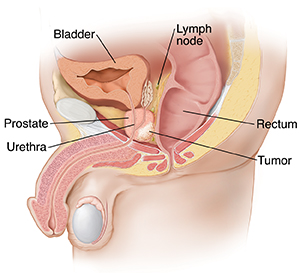Prostate Cancer
Prostate cancer begins when abnormal cells in your prostate gland multiply. An estimated 1 in 8 men in the United States will be diagnosed with prostate cancer at some point in their lives. Fortunately, advances in early detection and treatment have greatly reduced the risk of life-changing side effects. Our goal is to treat the cancer while helping you preserve function and maintain your best quality of life.
Why choose us for prostate cancer care?

BJC HealthCare offers excellent care for prostate cancer, at any stage. Our Siteman Cancer Center at Barnes-Jewish Hospital and WashU Medicine, along with its five satellite locations, is designated a Comprehensive Cancer Center by the National Cancer Institute (NCI).
In addition to Siteman locations, BJC HealthCare offers comprehensive and convenient care in locations across the region. Our Missouri Baptist Medical Center program is ranked among the top regional hospitals by U.S. News & World Report as high performing in prostate cancer surgery and is nationally accredited by the Commission on Cancer (CoC).
We combine a comprehensive and multidisciplinary approach, research, and clinical excellence in locations designed by patients, doctors, and nurses. Decades of experience has taught us that when treating cancer, comfort and compassion are just as important as the science of medicine.
When you to come to us for prostate cancer treatment, you can expect:
- Nationally recognized expertise: Siteman Cancer Center means access to superior care close to home. Siteman is consistently ranked as one of the top 10 cancer centers in the nation by U.S. News & World Report.
- Early and accurate diagnosis: Our experts have pioneered new techniques to improve prostate cancer diagnosis. We use highly sensitive prostate-specific antigen (PSA) tests to accurately detect prostate cancer. We’ve also developed high-tech, 3D ultrasound-guided biopsies to find tumors that might otherwise be missed.
- Advanced therapies: Our care for prostate cancer not only targets the disease but also focuses on helping you retain essential function. We use targeted radiation that doesn’t negatively impact your bladder or bowels. And our innovative nerve-sparing surgical techniques result in fewer sexual side effects.
- Personalized treatment plans: Prostate cancer care is not one size fits all. Our customized approach means focusing on exactly what you need. In some cases, that might mean careful monitoring. For others, an aggressive combination of innovative treatments may be necessary. Our goal is to find the right approach for each patient.
- Research and clinical trials: New therapies for prostate cancer—as well as novel combinations of therapies—are constantly evolving. Our doctors participate in leading-edge clinical trials that help us improve treatment options. That means you have access to the most innovative discoveries sooner.
- Support throughout treatment and beyond: Prostate cancer, and its treatment, can leave behind physical and emotional side effects. We understand your concerns and are here to help you regain urinary and sexual function and feel like yourself again.

The Siteman approach to prostate cancer
At Siteman, we diagnose and treat prostate cancer with the most sophisticated imaging techniques, diagnostics, and therapies available. Our multidisciplinary team sees approximately 1,000 new prostate cancer patients a year. Each patient receives an individualized treatment plan for his prostate cancer.
What is prostate cancer?
Cancer starts when cells in the body change and grow out of control. Cancer cells can form lumps of tissue called tumors. Cancer that starts in the cells of the prostate is called prostate cancer. It can grow and spread beyond the prostate. Cancer that spreads is harder to treat.
Understanding the prostate
The prostate is a gland in men about the size and shape of a walnut behind the base of the penis. It wraps around the upper part of the urethra. This is the tube that carries urine from the bladder through the penis and out of the body. The prostate makes some of the fluid that’s part of semen. During orgasm, semen comes out of the body through the urethra.
When prostate cancer forms
As a man ages, the cells of his prostate often grow bigger. Most older men notice a change in their urine flow related to an enlarging prostate.
- Noncancerous (not cancer). As a man ages, the prostate tends to get bigger. This is called benign prostatic hyperplasia (BPH). With BPH, the extra prostate tissue often squeezes the urethra, causing symptoms, such as trouble passing urine. But BPH is not cancer, and it doesn't lead to cancer.
- Atypical cells. Sometimes prostate cells don’t look like normal (typical) prostate cells. One type of abnormal growth is called prostatic intraepithelial neoplasia or PIN. PIN cells are not cancer cells. But if the pattern of cells is very abnormal (called high-grade PIN), there's about a 1 in 5 chance that there might be cancer in another part of the prostate, or on a future biopsy.
- Cancer. A diagnosis of prostate cancer needs a biopsy of the prostate. A pathologist looks at the biopsy sample under a microscope. If the tissue structure looks disorganized and the prostate cells look abnormal, the pathologist may diagnose prostate cancer. If the prostate cells have invaded other tissues, they're called cancer cells. Some tumors can be felt during a physical exam, but depending on the location of the cancer in the prostate, some cannot be felt. Over time, prostate cancer may grow into nearby tissue or organs, or spread to nearby lymph nodes. Lymph nodes are small organs around the body that are part of the immune system. In some cases, the cancer spreads to bones or organs in distant parts of the body. This is called metastasis.
Diagnosing prostate cancer
Prostate cancer may not cause symptoms at first. Urinary problems are often not a sign of cancer, but of another condition, such as BPH. If your doctor thinks you may have prostate cancer, they will ask about your symptoms, health history, and family history. They may do a digital rectal exam, by inserting a finger into your rectum to feel for lumps on your prostate. Other common tests include:
- Prostate specific antigen (PSA) testing. This is a blood test. PSA is a chemical made by prostate cells. The amount of PSA in the blood (PSA level) can be tested to check for prostate cancer. In general, a high or rising PSA level may mean there's cancer. What is considered a normal PSA increases with age.
- Core needle biopsy. This test is needed to know for sure if a man has prostate cancer. A hollow needle is used to take tiny pieces of tissue from the prostate. During the test called a transrectal ultrasound guided biopsy, a small probe is put into the rectum. The probe sends an image of the prostate to a video screen. With this image as a guide, the doctor uses a thin, hollow needle to remove tissue samples from all over the prostate. These are sent to a lab where they are looked at and tested for cancer cells.
Ask your doctor what tests you will need and what to expect.
Search for a specialist
Our highly trained team of specialists offers advanced treatments as well as compassionate, personalized care.
How is prostate cancer treated?
We take an individualized approach to treating prostate cancer. The best treatment for you will depend on the size, location, and stage of the prostate tumor.
We understand that you may have concerns about how your treatment will affect your urinary and sexual function. Our goal is to not only effectively treat the cancer, but to also preserve your quality of life. We use advanced therapies designed to minimize long-term side effects.
Prostate cancer treatment may include a combination of therapies, such as:
Radiation oncology
Locations near you.
Prostate Cancer News & Resources
News
